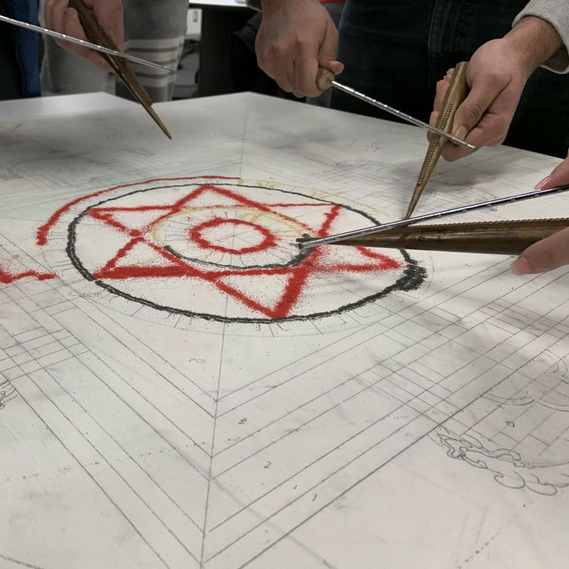Applied Mindfulness Program for Medical Personnel Training Program & Research Study
Principal Investigators: Dr. Julie Maggi & Dr. Elli Weisbaum
A training and complimentary research study being conducted through the Temerty Faculty of Medicine’s Office of Clinical and Faculty Affairs for physicians who work with, or are members of, underserved communities. Funded in 2024-25 through an Ontario Medical Foundation grant to run a training and research study examining physician burnout/wellness, this study is part of ongoing work exploring how to best support physicians in their roles as care providers. This prospective qualitative study consists of a thematic analysis of post-program interviews with physicians from across different specialties who participate in the Applied Mindfulness Program for Medical Personnel. The program includes 2-hour sessions delivered once a week over 5 weeks, and is based on the teachings of Thích Nhất Hạnh.
The Neuroscience of Expert Meditation Project
Principal Investigators: Dr. Mark Miller, together with Jonas Mago and Michael Lifshitz (McGill University)
The team been awarded a 2024 Mind & Life Francisco J. Varela Research Grant for this project, which aims to integrate state-of-the-art neuroimaging devices (e.g. versatile EEG), neurocomputational frameworks and techniques (e.g. active inference), and cutting-edge qualitative methods to better understand the neurobiology and phenomenology of advanced meditation states. They are already working with advanced Buddhist meditators in North America and in an Asian monastic context in Myanmar, Thailand, Cambodia, Vietnam, and Laos. The project represents a major step towards fostering a new science of Buddhist meditation – a computational contemplative neuroscience.
CAARE Lab – Cognitive Neuroscience, Agency & AI Reflection Ethics Lab
Lab Director: Dr. Alex Djedovic | Senior Fellow: Bear Malcolm Ramsay-St. Claire | Assistant Lab Manager: Chanté Brown
The Cognitive Neuroscience & AI & Agency Reflection Ethics Lab (CAARE Lab) explores the intersection of cognitive science, philosophy of biology, and artificial intelligence, focusing on natural agency, cognition, and ethical AI development. Rooted in systems biology, complex systems theory, and embodied cognition, the lab challenges traditional divisions between biological and artificial intelligence. It aims to redefine cognition as an ecologically embedded phenomenon, addressing AI’s frame problem and ethical dilemmas. By integrating Buddhist philosophy, philosophy of mind, and AI ethics, CAAE Lab pioneers a holistic framework for designing AI systems that align with human values and agency.

Hosted by Professor Mark Miller, with sponsorship from the BPMH program and The Robert H.N. Ho Family Foundation Centre for Buddhist Studies, The Contemplative Science Podcast offers regular interviews with scientists, philosophers, religious studies scholars and others on a range of topics. Episodes bring listeners insights into subjects such as the nature of the mind; the illusion of the self; the nuances of “Buddhist science” and its critiques; the challenges of integrating mindfulness into scientific research; the role of phenomenology in contemplative science; the media’s portrayal of mindfulness; the intersection of psychedelics and meditation; or the ethical, philosophical, and practical dimensions of AI.

Created by Professor Frances Garrett, with sponsorship from eCampusOntario, Windvane is a teaching and learning resource centered around nearly 100 interviews with faculty, students, and staff around University of Toronto about how they are working to support student mental health and well-being. The project includes materials for classroom use and support for instructors wishing to enhance support for students in higher education.

Upaya is the official journal of the Buddhism & Psychology Student Union (BPSU). The undergraduate journal publishes work on contemplative science, featuring collaborative and interdisciplinary thinking within the discipline. The journal was published regularly for years and after a hiatus is now starting up again.

The “Engaging Education in Buddhist Studies” (EEBS) initiative was established in 2019 with support from Khyentse Foundation and the Robert H.N. Ho Family Foundation Centre for Buddhist Studies, and it is now administered by the BPMH program. EEBS supports student well-being through course design based in research on meta-cognitive, experiential, anti-oppressive, and contemplative pedagogies. The initiative provides support for (1) courses that enhance student experience using pedagogies that foster well-being (e.g., attention training, art-making, community-based learning, or environmental engagement); (2) dissemination of techniques; and (3) student networks focused on mental health. EEBS also supports the EASE Lab. The EEBS initiative is situated within newly developing, dynamic educational movements that are student-centered, place-responsive, contemplative, trauma-informed, and attentive to student well-being. The initiative partners with the Flourishing Academic Network (see discussion of FAN in LearningWell magazine here and here).